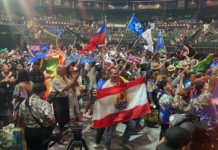Source: The Conversation (Au and NZ) – By Nicholas Procter, Professor and Chair: Mental Health Nursing, University of South Australia
Australians of Ukrainian heritage are bearing witness to heartbreaking scenes and ongoing uncertainty about the safety of family and loved ones. European agencies are warning of an impending humanitarian crisis. Although communications can be unreliable, technology makes it possible for us to see and hear war in real time. Ukrainian Australians are experiencing a powerful emotional pull to the Ukraine with friends, family and history there.
Previous research into the impact of global catastrophic events on the diaspora – scattered communities with shared cultural links – tells us much about the push-pull impact on local people of global events. Diaspora migrant groups should not be seen as isolated from their country of origin. Rather, they are subject to global influences over their personal and social life, their health and well-being.
Australians with ancestral linkages to homeland violence and war can identify completely with the pain and anguish they see and hear. The same is true of communities in other parts of the world with Ukrainian ties. But we can support ourselves and others during this time.
Read more:
Saint Olga of Kyiv is Ukraine’s patron saint of both defiance and vengeance
Long-distance suffering
How people manage the interplay between homeland events, media reports, cultural identity and mental health issues in Australia is complex.In what I call “long-distance suffering and devastation”, people are physically and emotionally here, as well as emotionally “over there”. During the Balkan war of 1991–2001, some people with ancestral links to that region living in Australia reported they could not watch television. The coverage made some of them physically ill.
Their experiences fluctuated in response to good and bad news about homeleand events.
Emotions ranged from periods of relief and calm, to unbearable fear, sleeplessness, irritability, inability to concentrate, feelings of frustration, loneliness, sadness, worry, guilt and bouts of extreme emotional exhaustion.
In these past times, people found safety in the comfort of others, and connecting or reconnecting with their cultural identity. Shared meals and social gatherings, alongside cultural and spiritual rituals were found to be helpful.
Read more:
From ‘Vladdy daddy’ to fake TikToks: how to guide your child through Ukraine news online
A trauma-informed response
Being trauma-informed begins with trauma awareness, involves strengths-based approaches, facilitating choice and remaining flexible through trusting engagement.
Validation of distress is central to trauma-informed approaches. That means helping people feel their emotions have been heard, understood and are accepted.
There have been encouraging signs of a coordinated refugee response. Prime Minister Scott Morrison says Australia has been fast-tracking visa applications from Ukrainians and will support refugees from the region.
Creating a safe haven for refugees fleeing conflict will help those directly affected and reassure those who are concerned about them. Services for children and young people – who may be at increased risk of mental health problems and have greater difficulty accessing mental health care – must be prioritised.
In the interim there are several ways to provide practical help and join relief efforts from afar.
Comfort and support
Bearing witness to the loss of life and property in familiar (though distant) surroundings can be devastating.
At an individual level, it’s about remaining aware of what is going on, staying informed and engaged in ways that don’t overwhelm. It can be helpful to calibrate media exposure and rely on trusted sources.
If supporting family in Australia or elsewhere, work towards a situation where the person feels listened to, understood and validated.
Some other supportive ideas include:
-
recognising distress triggers and encouraging breaks from coverage. If news generates anxiety or worry, counter this with an activity that brings closeness and human connection
-
doing things that have worked in the past to help bring calm. Mindfulness meditation or mindfulness-based activity can be grounding
-
seeking out company with trusted others. This may not be to necessarily discuss unfolding events. The company of others could include conversation about non-war topics
-
ensuring a good night’s sleep.
When it all gets too much
If events are making concentration at work difficult or impacting on employment, people should speak with their workplace supervisors.
Research shows exercise-based interventions (from yoga to high-intensity running) and peer-led actions (such as sharing lived experiences) designed to increase social connection, have good potential to address mild-moderate depression. There are a wide range of psychological treatments for anxiety too.
If you are feeling fragile or concerned about your mental health, or the mental health of a loved one, seek support from your health care provider. Getting help early can make it easier to accept help going forward.
Employers should show understanding and suggest practical ways to support people impacted. Given the trajectory of the conflict is also unclear and may involve other countries, there will likely be ongoing collateral effects. In times like these, it’s OK to not be OK.
If this article has raised issues for you, or if you’re concerned about someone you know, call Lifeline on 13 11 14.
![]()
Nicholas Procter does not work for, consult, own shares in or receive funding from any company or organization that would benefit from this article, and has disclosed no relevant affiliations beyond their academic appointment.
– ref. Torn between worlds, Ukrainian Australians are feeling the mental health impacts of war. Here’s how to help – https://theconversation.com/torn-between-worlds-ukrainian-australians-are-feeling-the-mental-health-impacts-of-war-heres-how-to-help-178020







